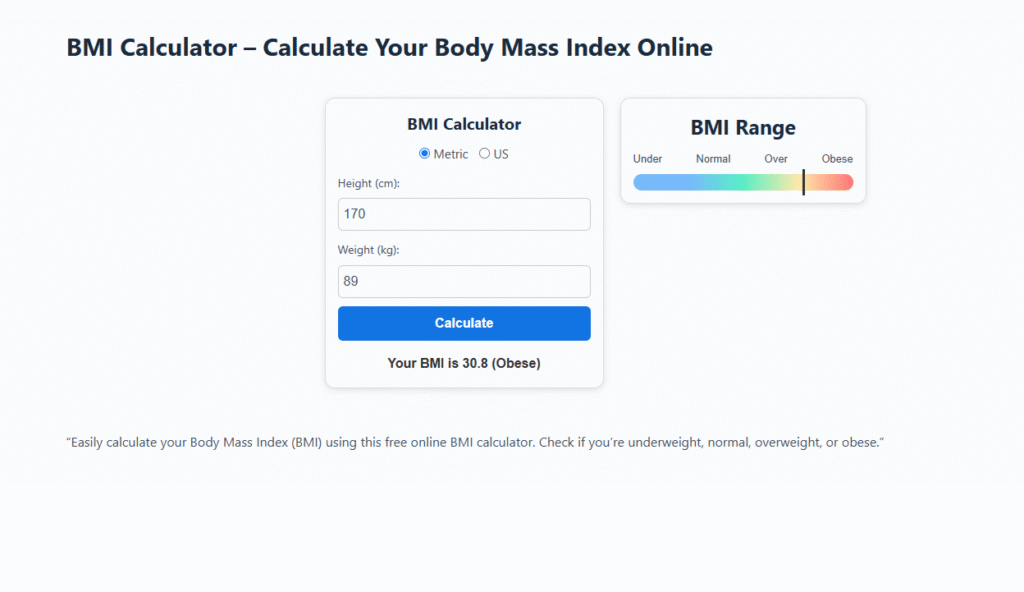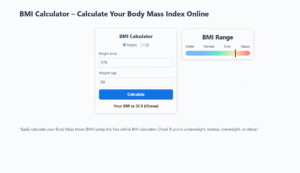
If you’ve ever wondered whether your weight is in a healthy range for your height, a BMI calculator (Body Mass Index calculator) is one of the easiest tools you can use.
It’s fast, simple, and gives you an immediate idea of where you stand in terms of body weight and health.
What Is BMI and Why It Matters
BMI stands for Body Mass Index, a simple formula that compares your weight and height.
It’s calculated by dividing your weight (in kilograms) by the square of your height (in meters). The resulting number helps determine whether you are underweight, at a normal weight, overweight, or obese.
Although BMI doesn’t take into account muscle mass, body fat percentage, or body composition, it’s still one of the most widely used indicators of general health and fitness.
Doctors, nutritionists, and fitness coaches often use BMI as a starting point when evaluating someone’s overall health.
How to Use a BMI Calculator Step by Step
Using a BMI calculator is incredibly easy. Here’s how it works:
-
Enter your height (in centimeters or feet and inches).
-
Enter your weight (in kilograms or pounds).
-
Click the “Calculate” button.
In just a second, you’ll get your BMI value and a short description that explains your category, such as underweight, normal weight, overweight, or obese.
To try it yourself, visit the free BMI Calculator on MoreThanCalculators.com.
It’s completely free and works on any device – mobile, tablet, or computer.
Understanding Your BMI Results
Once you have your BMI result, it’s important to know what it means.
Below is the standard classification used by the World Health Organization (WHO):
| BMI Value | Category |
|---|---|
| Below 18.5 | Underweight |
| 18.5 – 24.9 | Normal weight |
| 25.0 – 29.9 | Overweight |
| 30.0 – 34.9 | Obese (Class I) |
| 35.0 – 39.9 | Obese (Class II) |
| 40.0 and above | Obese (Class III – severe obesity) |
If your BMI falls within the normal range, it means your weight is likely appropriate for your height.
If it’s higher or lower, that may indicate potential health risks such as heart disease, diabetes, or nutritional deficiencies — but remember, BMI is only a starting point, not a medical diagnosis.
Why BMI Is Useful (and What It Doesn’t Tell You)
The BMI calculator is useful because it’s quick and easy — it doesn’t require medical tests or lab results.
It gives you a general idea of whether you’re maintaining a healthy weight.
However, BMI has its limitations.
It doesn’t distinguish between muscle and fat mass. For example, an athlete with a lot of muscle may have a high BMI but still have a low body fat percentage.
Likewise, two people with the same BMI can have very different body compositions.
That’s why BMI should be seen as an initial indicator.
For a more accurate assessment of your health, you can combine BMI with other tools such as body fat percentage calculators, waist-to-height ratio, or waist circumference measurements.
Tips for Maintaining a Healthy BMI
If your BMI is above or below the normal range, don’t panic — it’s simply a guide.
Here are a few tips for keeping your BMI in a healthy zone:
-
Eat balanced meals with plenty of fruits, vegetables, lean proteins, and whole grains.
-
Stay active – aim for at least 30 minutes of moderate exercise most days of the week.
-
Sleep well – poor sleep can affect your metabolism and appetite.
-
Stay hydrated – drinking water regularly helps regulate hunger and digestion.
-
Track your progress – use online tools like the free BMI Calculator to monitor changes over time.
Small lifestyle changes can make a big difference over the long term.
Final Thoughts
Knowing your BMI is a great first step toward understanding your body and overall health.
While it’s not a perfect measure, it gives you a quick overview of whether your weight is in a healthy range for your height.
You can calculate your BMI anytime using the free BMI calculator on MoreThanCalculators.com.
It’s simple, accurate, and provides instant feedback so you can take control of your health journey today.


